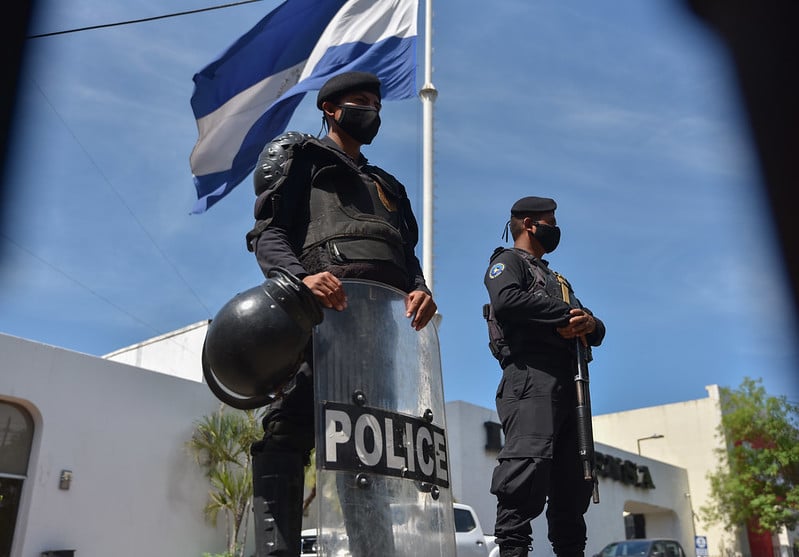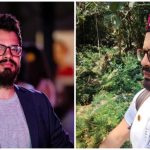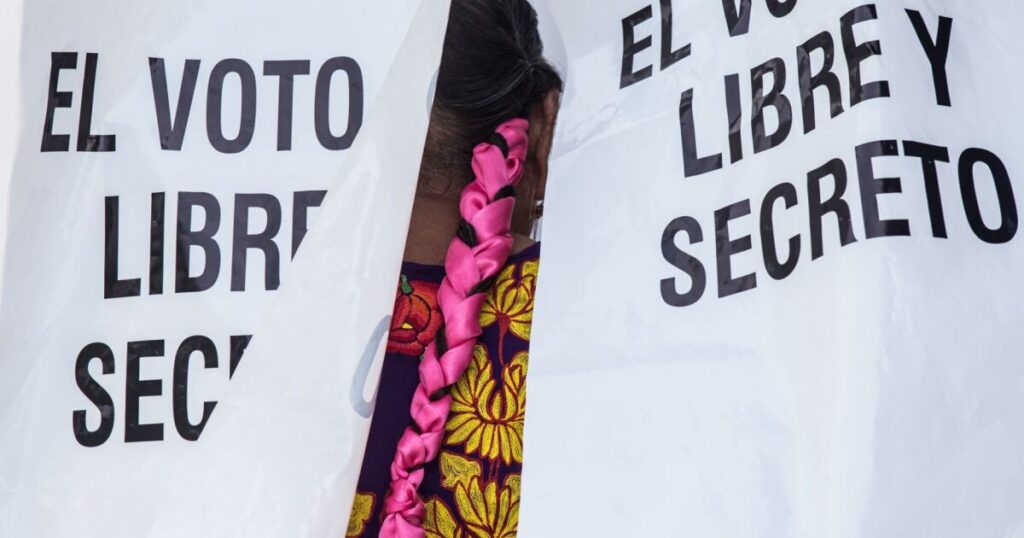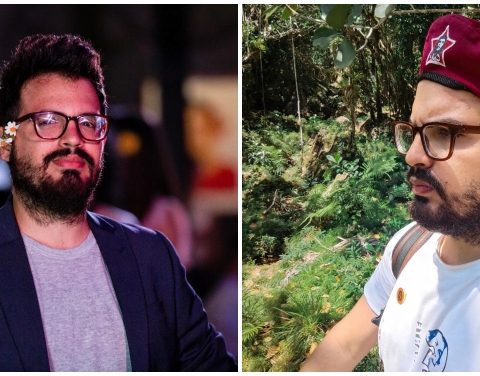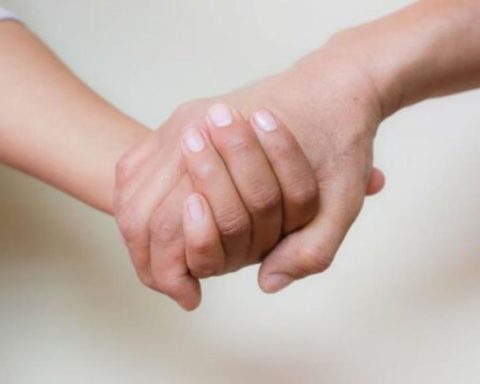The continuity of Daniel Ortega in power, after his third consecutive reelection, generates a “terrifying” prospect in a Nicaragua where, in the words of the organization Amnesty International (AI): “human rights violations have become increasingly common” and expressing criticism against the government leaves citizens “at serious risk.”
“We have witnessed the development of the plot of a horror story in the country, where lethal repression, illegal detentions, mistreatment, harassment and criminalization are common practices,” says Erika Guevara Rosas, director for the Americas of AI.
“2021 was a disastrous year, in which the police state was hardened against the population, forcing thousands to shut up or leave the country,” says the lawyer and human rights defender, Gonzalo Carrión, from the Nicaragua Rights Collective Never Again, exiled in Costa Rica since the end of 2018.
For Carrión, 2021 was an “extremely negative, repressive and regressive year for the entire Nicaraguan people” in which there was “a systematic attack on all critical voices”, since he estimates that Daniel Ortega “already knows that he lost all social control and he only knows how to exercise power through rifles ”.
Imprisonment of candidates, and civic leaders
On May 28 of this year, Nicaragua witnessed — then without knowing it — the beginning of the worsening of the most recent repressive escalation of the regime of Daniel Ortega and Rosario Murillo, which today holds at least 167 political prisoners.
That day, the regime ordered the kidnapping of two former employees of the Violeta Barrios de Chamorro Foundation (FVBCh): Walter Gómez and Marcos Fletes, who have been in prison for more than 200 days and have hardly received any visits from their relatives, despite the demand. respect for their human rights.
Five days later – Wednesday June 2 – he decreed house arrest for the independent presidential candidate, Cristiana Chamorro Barrios, former president of said Foundation. The official argument was that the three are “investigated” for alleged money laundering. But they were only the first of an operation that the ruling party baptized as “Danto 2021”, and that the opposition and the international community describe as a “repressive escalation”.
Later, he locked up six other presidential candidates who wanted to participate in the last elections on November 7, in which Ortega and Murillo were re-elected without political competition: Arturo Cruz, Félix Maradiaga, Juan Sebastián Chamorro, Miguel Mora, Medardo Mairena and Noel Vidaurre.
From then on, the Ortega hunt, using its combo of repressive laws, continued against opposition leaders, journalists, peasants, businessmen, students. A situation that worsened days before the voting process when at least 27 Nicaraguans were imprisoned.
Relatives of political prisoners and human rights organizations have denounced the torture and solitary confinement that they live in the different prisons of the country. Ortega’s response has been to qualify them as “criminals.”
UN: 50 countries demand to release prisoners and end repression
Fifty countries demanded on September 14 the immediate release of all political prisoners in Nicaragua, in a joint statement in the framework of the 48th session of the United Nations (UN) Human Rights Council.
President Daniel Ortega, in his speech a day later, kept silent about this and other events in the long list of human rights violations committed by his Government. However, after announcing his victory in the voting without political competition, he has called political prisoners “murderers” and “sons of bitches”.
Meanwhile, the Inter-American Commission on Human Rights (IACHR) reported in November of this year that the number of fatalities in the context of the human rights crisis that began on April 18, 2018 in Nicaragua was 355 people.
In a report, they indicate that these deaths were the result of the excessive use of force, including lethal force, by state agents and vigilante forces. Of the 355 fatalities registered between April 18, 2018 and July 31, 2019, 340 are men and 15 women.
“There has been particularly this year, a cruelty of the regime with the families of the victims. Both the political prisoners and the murdered. Many have had to leave the country because of the persecution and threats that they are living, ”says Gonzalo Carrión, from the Nicaraguan Rights Collective Never Again,
Ortega among 37 predators of world press freedom
Carrión affirms that in 2021 “criminalization and hatred” against critical voices has been particularly directed against independent media and journalists.
“The executioner’s sights were placed with special emphasis on journalism, because they know that they are the bearers of the information that reveals their blatant violations of the human rights of the people,” he says.
Proof of this is that the international organization Reporters Without Borders (RSF) ranked Daniel Ortega as one of the 37 “predators of press freedom” worldwide, on its 2021 list of heads of state who “impose massive repression against Press freedom”.
The “method of predation” used by the Ortega regime against Nicaragua’s independent press, according to the report, is that of “economic asphyxia and judicial censorship.”
This year more than 70 journalists went into exile for the persecution of the regime, which imprisoned the founder of 100% Noticias, Miguel Mora, the sports writer Miguel Mendoza, the manager of the newspaper La Prensa, Juan Lorenzo Holmann and the television commentator, Jaime Arellano .
Second raid on CONFIDENTIAL and seizure of La Prensa
On the morning of Thursday, May 20, a dozen riot police stormed the television studio that had provisionally installed the newsroom of CONFIDENTIAL, in an office of a corporate center, to produce Esta Semana and Esta Noche, after at midnight on December 13, 2018 the same Police militarily occupied the editorial building in Planes de Altamira, until consummating the illegal confiscation of the property in February of this year.
“This would be the second time that the dictatorship has launched a frontal attack against this media outlet that was illegally assaulted in the early morning of December 13, 2018, so they stole everything from us. The next day they illegally occupied the writing of CONFIDENTIAL and they held that occupation for two years and three months. Until they carried out the final confiscation ”, explained its director, Carlos Fernando Chamorro.
Daniel Ortega, who is also the Supreme Chief of the National Police, ordered on Friday, August 13, the seizure of the newspaper The Press. A day after the board of directors of the oldest newspaper in Nicaragua announced that it would no longer circulate its printed edition due to a “blockade of inputs” imposed by the regime.
The dictator justified the raid by claiming, without any proof, that The Press has incurred in the alleged crimes of customs fraud and money laundering. “When the State is slandered, it is a crime,” he declared in a threatening tone the same night of the assault that ended with the imprisonment of his general manager.
Ortega disrespects the Inter-American Court
The Inter-American Court of Human Rights (Inter-American Court) declared the State of Nicaragua in “contempt” for refusing to comply with the provisional measures of that court in favor of 21 political prisoners and warned that it will submit to the consideration of the General Assembly of the Organization of American States (OAS) the decision of this country.
In the Court’s opinion, “the position assumed by Nicaragua, according to which there is no will to comply with the Court’s orders, constitutes an act of evident contempt for the decisions of this Court, contrary to the international principle that imposes to the State the duty to abide by its conventional obligations in good faith, as well as a breach of the duty to inform this court, “says the resolution.
In the Court’s resolutions of June 24, September 9 and November 4, 2021, that court granted provisional measures and ordered the release of the political prisoners: Juan Sebastián Chamorro, José Adán Aguerri, Félix Maradiaga, Lesther Alemán, Freddy Navas, Pedro Joaquín Chamorro, Walter Gómez, Marcos Fletes, Pedro Vásquez, Arturo Cruz, Luis Rivas, Miguel Mora, Hugo Torres, Víctor Hugo Tinoco, José Pallais, Violeta Granera, Tamara Dávila, Cristiana Chamorro, Dora María Téllez, Ana Margarita Vijil and Suyén Barahona. But the Nicaraguan State has ignored them.
For the president of the Nicaraguan Center for Human Rights (Cenidh), Vilma Núñez, it is clear that the regime “is far from all legality” because these sentences are mandatory.
“The problem is that we are facing a dictatorship that does not respect its international commitments, and through lies and insults continues to insult political prisoners,” says Núñez.
Massacre against indigenous people continues
Hunting against Mayan and Miskito indigenous people continued in 2021. Settler attacks, although less frequent compared to reports in 2020, killed at least 12 people between January and October 2021.
CONFIDENTIAL registered three complaints of settler attacks against indigenous Mayangnas and Miskitos that have occurred in 2021, thus confirming that the affected areas were Wilus, Kiwakumbai and Kimakwas, all located in the Sauni As territory, within the Bosawás Biosphere Reserve.
An analysis of data from CONFIDENTIALBased on the reports of attacks in recent years, it verifies that, from April 2018 to October 2021, the invasions of settlers increased and left a balance of at least 27 indigenous Miskito and Mayangnas murdered, without it being known so far. the arrest or conviction of those responsible.
Closure of organizations
The Ortega regime, with the vote of the Sandinista deputies and their allies, have outlawed approximately fifty Nicaraguan Oenegés so far this year, adding 58 organizations canceled since 2018.
During this year the Ministry of the Interior has canceled the registrations and perpetual numbers of three US and three European NGOs. The projects of the closed organizations, including medical and women’s, benefited thousands of people throughout the country.
“There is an eagerness to disappear the work of organized civil society. It is a disastrous year because the rights of dozens of people have been violated and hundreds of project beneficiaries throughout the country have been harmed ”, affirms the defender, Gonzalo Carrión.
For Carrión there is no way for Ortega to remain in power “if it is not by force of arms, because he does not have popular support and that was demonstrated in the electoral farce that the majority of the people did not attend.”
